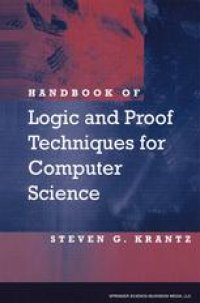
Ebook: Handbook of Logic and Proof Techniques for Computer Science
Author: Steven G. Krantz (auth.)
- Tags: Mathematical Logic and Formal Languages, Math Applications in Computer Science, Applications of Mathematics, Mathematical Logic and Foundations, Arithmetic and Logic Structures, Logic Design
- Year: 2002
- Publisher: Birkhäuser Basel
- Edition: 1
- Language: English
- pdf
Logic is, and should be, the core subject area of modern mathemat ics. The blueprint for twentieth century mathematical thought, thanks to Hilbert and Bourbaki, is the axiomatic development of the subject. As a result, logic plays a central conceptual role. At the same time, mathematical logic has grown into one of the most recondite areas of mathematics. Most of modern logic is inaccessible to all but the special ist. Yet there is a need for many mathematical scientists-not just those engaged in mathematical research-to become conversant with the key ideas of logic. The Handbook of Mathematical Logic, edited by Jon Bar wise, is in point of fact a handbook written by logicians for other mathe maticians. It was, at the time of its writing, encyclopedic, authoritative, and up-to-the-moment. But it was, and remains, a comprehensive and authoritative book for the cognoscenti. The encyclopedic Handbook of Logic in Computer Science by Abramsky, Gabbay, and Maibaum is a wonderful resource for the professional. But it is overwhelming for the casual user. There is need for a book that introduces important logic terminology and concepts to the working mathematical scientist who has only a passing acquaintance with logic. Thus the present work has a different target audience. The intent of this handbook is to present the elements of modern logic, including many current topics, to the reader having only basic mathe matical literacy.
There is a need for many mathematical scientists-not just those engaged in mathematical research-to become conversant with the key ideas of logic. The "Handbook of Mathematical Logic", edited by Jon Barwise, is in point of fact a handbook written by logicians for other mathematicians. It was, at the time of its writing, encyclopedic, authoritative, and up-to-the-moment. But it was, and remains, a comprehensive and authoritative book for the cognoscenti. The encyclopedic "Handbook of Logic in Computer Science" by Abramsky, Gabbay, and Maibaum is a wonderful resource for the professional. But it is overwhelming for the casual user. There is need for a book that introduces important logic terminology and concepts to the working mathematical scientist who has only a passing acquaintance with logic. Thus the present work has a different target audience. The intent of this handbook is to present the elements of modern logic, including many current topics, to the reader having only basic mathematical literacy. Certainly a college minor in mathematics is more than sufficient background to read this book. Specifically, courses in linear algebra, finite mathematics, and mathematical structures would be more than adequate preparation. From the computer science side, it would be good if the reader knew a programming language and had some exposure to issues of complexity and decidability. But all these prerequisites are primarily for motivation. This handbook is, to the extent possible, self-contained. It will be a compact and accessible reference.
Content:
Front Matter....Pages i-xix
Notation and First-Order Logic....Pages 1-18
Semantics and Syntax....Pages 19-24
Axiomatics and Formalism in Mathematics....Pages 25-38
The Axioms of Set Theory....Pages 39-42
Elementary Set Theory....Pages 43-83
Recursive Functions....Pages 85-94
The Number Systems....Pages 95-106
Methods of Mathematical Proof....Pages 107-120
The Axiom of Choice....Pages 121-126
Proof Theory....Pages 127-132
Category Theory....Pages 133-143
Complexity Theory....Pages 145-165
Boolean Algebra....Pages 167-173
The Word Problem....Pages 175-182
Back Matter....Pages 183-245
Content:
Front Matter....Pages i-xix
Notation and First-Order Logic....Pages 1-18
Semantics and Syntax....Pages 19-24
Axiomatics and Formalism in Mathematics....Pages 25-38
The Axioms of Set Theory....Pages 39-42
Elementary Set Theory....Pages 43-83
Recursive Functions....Pages 85-94
The Number Systems....Pages 95-106
Methods of Mathematical Proof....Pages 107-120
The Axiom of Choice....Pages 121-126
Proof Theory....Pages 127-132
Category Theory....Pages 133-143
Complexity Theory....Pages 145-165
Boolean Algebra....Pages 167-173
The Word Problem....Pages 175-182
Back Matter....Pages 183-245
....